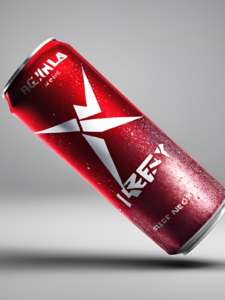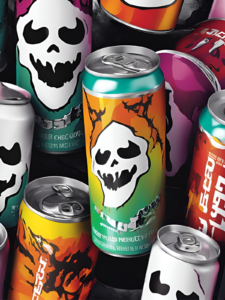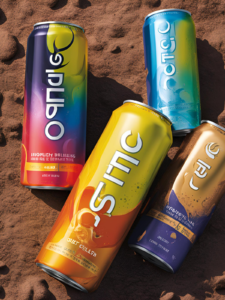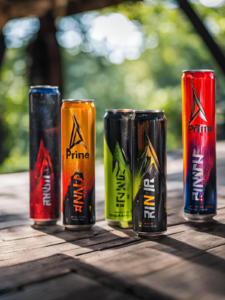Explore Energy Drinks’ 5 Unique Types
Monster Energy Drinks
Monster Energy is a popular brand of energy drinks created by Monster Beverage Corporation. Launched in April 2002, Monster Energy has grown to become one of the leading energy drink brands worldwide, recognized by its distinctive claw-like “M” logo. The brand markets its beverages as providing a powerful energy boost, often associating itself with extreme sports, gaming, music, and various other high-energy activities.
Ingredients
Monster Energy drinks contain a blend of ingredients designed to provide energy and enhance mental focus. Here are the primary ingredients:
- Carbonated Water
- Sugar (or a sugar substitute in sugar-free versions)
- Glucose
- Citric Acid
- Natural Flavors
- Taurine
- Sodium Citrate
- Color Additives (like caramel color)
- Panax Ginseng Root Extract
- L-Carnitine L-Tartrate
- Caffeine
- Sorbic Acid (preservative)
- Benzoic Acid (preservative)
- Niacinamide (Vitamin B3)
- Sodium Chloride (Salt)
- D-Glucuronolactone
- Guarana Seed Extract
- Inositol
- Sucralose (sweetener, in some versions)
- Pyridoxine Hydrochloride (Vitamin B6)
- Riboflavin (Vitamin B2)
- Maltodextrin
- Cyanocobalamin (Vitamin B12)
Nutrition Information
The nutritional content of Monster Energy drinks can vary depending on the specific product. Here is a general overview of the nutrition facts for a standard 16 fl oz (473 ml) can of Original Monster Energy:
- Calories: 210
- Total Fat: 0g
- Sodium: 370mg
- Total Carbohydrate: 54g
- Sugars: 54g
- Protein: 0g
- Caffeine: 160mg
Vitamins and Minerals:
- Niacin (Vitamin B3): 250% of Daily Value (DV)
- Vitamin B6: 240% of DV
- Vitamin B12: 490% of DV
- Riboflavin (Vitamin B2): 190% of DV
Monster Energy drinks are formulated to provide a quick and effective energy boost, leveraging a combination of caffeine, sugar, and other energy-enhancing ingredients. While they can be beneficial for short-term energy needs, consumers should be mindful of the high sugar and caffeine content and consume them in moderation.
Red Bull Energy Drink
Red Bull is a globally renowned energy drink brand, often credited with popularizing the energy drink category. Introduced in 1987 by Dietrich Mateschitz and Chaleo Yoovidhya, Red Bull is marketed as a beverage that “gives you wings” by boosting mental and physical performance. Known for its iconic slim blue and silver can, Red Bull has a significant presence in extreme sports, gaming, music, and various other high-energy events and activities.
Ingredients
Red Bull contains a blend of ingredients designed to improve concentration and stimulate alertness. The primary ingredients include:
- Carbonated Water
- Sucrose
- Glucose
- Citric Acid
- Taurine
- Sodium Bicarbonate
- Magnesium Carbonate
- Caffeine
- Niacinamide (Vitamin B3)
- Calcium Pantothenate (Vitamin B5)
- Pyridoxine HCl (Vitamin B6)
- Riboflavin (Vitamin B2)
- Artificial Flavors and Colors
Nutrition Information
The nutritional content of Red Bull can vary slightly depending on the specific product, but here is a general overview of the nutrition facts for a standard 8.4 fl oz (250 ml) can of Original Red Bull:
- Calories: 110
- Total Fat: 0g
- Sodium: 105mg
- Total Carbohydrate: 28g
- Sugars: 27g
- Protein: 0g
- Caffeine: 80mg
Vitamins and Minerals:
- Niacin (Vitamin B3): 140% of Daily Value (DV)
- Vitamin B6: 350% of DV
- Vitamin B12: 120% of DV
- Pantothenic Acid (Vitamin B5): 70% of DV
Red Bull energy drinks are formulated to provide a quick and effective energy boost, with a combination of caffeine, sugar, and other energy-enhancing ingredients. While they are effective for enhancing alertness and concentration, it is important to consume them in moderation due to the high sugar and caffeine content.
Ghost Energy Drinks
Ghost Energy Drinks are a relatively new entrant in the energy drink market, known for their unique branding and commitment to transparency in ingredient labeling. Launched by Ghost Lifestyle, a brand that initially gained popularity with its dietary supplements, Ghost Energy Drinks are formulated to provide a boost in energy, focus, and performance. The drinks are marketed toward fitness enthusiasts, gamers, and anyone in need of a quick energy boost.
Ingredients
Ghost Energy Drinks contain a blend of ingredients designed to enhance energy levels and mental clarity. Here are the primary ingredients typically found in Ghost Energy Drinks:
- Carbonated Water
- Natural and Artificial Flavors
- Citric Acid
- Taurine
- Caffeine (from Natural Coffee Bean)
- Alpha-GPC (L-Alpha Glycerylphosphorylcholine)
- NeuroFactor (Coffee Arabica (Fruit) Extract)
- Acetyl-L-Carnitine
- Sodium Benzoate (preservative)
- Potassium Sorbate (preservative)
- Sucralose (sweetener)
- Acesulfame Potassium (sweetener)
- Vitamin C (Ascorbic Acid)
- Niacinamide (Vitamin B3)
- Calcium D-Pantothenate (Vitamin B5)
- Pyridoxine HCl (Vitamin B6)
- Cyanocobalamin (Vitamin B12)
Nutrition Information
The nutritional content of Ghost Energy Drinks can vary depending on the specific flavor, but here is a general overview of the nutrition facts for a standard 16 fl oz (473 ml) can:
- Calories: 5
- Total Fat: 0g
- Sodium: 35mg
- Total Carbohydrate: 1g
- Sugars: 0g
- Protein: 0g
- Caffeine: 200mg
Vitamins and Minerals:
- Vitamin C: 100% of Daily Value (DV)
- Niacin (Vitamin B3): 25% of DV
- Vitamin B6: 25% of DV
- Vitamin B12: 25% of DV
- Pantothenic Acid (Vitamin B5): 25% of DV
Ghost Energy Drinks are designed to provide a clean and effective energy boost, combining natural caffeine, amino acids, and brain-boosting nootropics. With a commitment to transparency and quality ingredients, Ghost Energy Drinks offer a modern and health-conscious option for those seeking enhanced energy and focus.
Celsius Energy Drinks
Celsius Energy Drinks are marketed as a healthier alternative to traditional energy drinks, focusing on providing energy and promoting weight loss and metabolism. Launched in 2005, Celsius combines a variety of natural ingredients designed to boost energy levels and improve physical performance. Known for their clean, non-artificial approach, Celsius drinks are popular among fitness enthusiasts and those looking for a more health-conscious energy boost.
Ingredients
Celsius Energy Drinks contain a blend of natural ingredients designed to enhance energy and support metabolism. Here are the primary ingredients typically found in Celsius Energy Drinks:
- Carbonated Filtered Water
- Citric Acid
- Natural Flavors
- Caffeine (from natural sources such as guarana and green tea)
- Taurine
- Guarana Extract (seed)
- Green Tea Leaf Extract (standardized to 10% EGCG)
- Ginger Extract (root)
- Vitamin C (Ascorbic Acid)
- Calcium Carbonate
- Chromium Picolinate
- Beta-Carotene (color)
- Sucralose (sweetener, in some versions)
- Stevia Leaf Extract (sweetener, in some versions)
- Sodium Bicarbonate
- Sodium Citrate
Nutrition Information
The nutritional content of Celsius Energy Drinks can vary depending on the specific flavor, but here is a general overview of the nutrition facts for a standard 12 fl oz (355 ml) can:
- Calories: 10
- Total Fat: 0g
- Sodium: 10mg
- Total Carbohydrate: 2g
- Sugars: 0g
- Protein: 0g
- Caffeine: 200mg
Vitamins and Minerals:
- Vitamin C: 60% of Daily Value (DV)
- Riboflavin (Vitamin B2): 100% of DV
- Niacin (Vitamin B3): 100% of DV
- Vitamin B6: 100% of DV
- Vitamin B12: 100% of DV
- Biotin: 100% of DV
- Pantothenic Acid (Vitamin B5): 100% of DV
- Calcium: 3% of DV
- Chromium: 67% of DV
Celsius Energy Drinks offer a unique blend of natural ingredients aimed at boosting energy and metabolism without the high sugar content found in many traditional energy drinks. With a focus on health and wellness, Celsius provides a refreshing and functional beverage option for those looking to enhance their physical performance and energy levels in a more natural way.
Prime Energy Drinks Ingredients List
Prime Energy drinks are a popular choice for those seeking a boost in energy and focus. Below is a chart listing the typical ingredients found in Prime Energy drinks:
| Ingredient | Description |
| Carbonated Water | Provides the drink with its fizziness. |
| Caffeine | A stimulant that enhances alertness and energy levels. |
| Taurine | An amino acid that supports neurological development and regulates water and mineral salts in the blood. |
| Ginseng Extract | Known for its potential to improve energy levels and reduce fatigue. |
| B Vitamins | Includes vitamins B3 (Niacinamide), B6 (Pyridoxine HCl), and B12 (Cyanocobalamin), which help convert food into energy and support brain function. |
| Glucuronolactone | A naturally occurring compound that may improve physical performance and reduce fatigue. |
| Inositol | Often included for its potential to support mental focus and mood. |
| L-Carnitine | An amino acid that helps in energy production by transporting fatty acids into the cells’ mitochondria. |
| Sucralose | A calorie-free artificial sweetener used to provide sweetness without added sugars. |
| Acesulfame Potassium | Another calorie-free sweetener often used in combination with other sweeteners to enhance taste. |
| Citric Acid | Used to add a tangy flavor and act as a preservative. |
| Natural and Artificial Flavors | Provide the characteristic taste of the drink. |
| Sodium Benzoate | Preservative to extend shelf life. |
| Potassium Sorbate | Preservative to inhibit mold and yeast growth. |
| Sodium Citrate | Helps control acidity and acts as a preservative. |
| Color Additives | Provide the drink with its distinctive color. |
Prime Energy drinks are designed to deliver a burst of energy through a combination of caffeine, vitamins, amino acids, and other ingredients. These components work together to enhance mental focus, reduce fatigue, and provide a refreshing and stimulating beverage option.
Side Effects of Energy Drinks
While energy drinks can provide a quick boost in energy and mental alertness, they also come with potential side effects, especially when consumed in large quantities or by sensitive individuals. Here are some common side effects associated with energy drinks:
- Increased Heart Rate and Blood Pressure: The caffeine content in energy drinks can lead to a rapid increase in heart rate and blood pressure, which may be dangerous for people with cardiovascular conditions.
- Insomnia and Sleep Disruptions: Consuming energy drinks, especially in the late afternoon or evening, can interfere with sleep patterns, leading to insomnia or poor-quality sleep.
- Jitters and Anxiety: High levels of caffeine can cause feelings of jitteriness, anxiety, and nervousness, particularly in individuals sensitive to caffeine.
- Digestive Issues: Ingredients like caffeine and artificial sweeteners can lead to gastrointestinal problems such as nausea, upset stomach, and diarrhea.
- Dehydration: Caffeine is a diuretic, which means it can increase urine production and potentially lead to dehydration if not balanced with adequate water intake.
- Headaches and Migraines: Excessive caffeine consumption can cause headaches and migraines, either from caffeine withdrawal or from the stimulant effect itself.
- Dependence and Withdrawal: Regular consumption of energy drinks can lead to caffeine dependence, resulting in withdrawal symptoms such as headaches, fatigue, and irritability when caffeine intake is reduced.
- Weight Gain: Some energy drinks contain high amounts of sugar, which can contribute to weight gain and increase the risk of developing type 2 diabetes and other metabolic disorders.
- Dental Problems: The high sugar content and acidity of some energy drinks can contribute to tooth decay and erosion of dental enamel.
- Adverse Interactions with Medications: Energy drinks can interact negatively with certain medications, particularly those for heart conditions, blood pressure, and mental health disorders.
While energy drinks can be effective in providing a short-term energy boost, it is important to consume them in moderation and be aware of the potential side effects. Individuals with underlying health conditions, pregnant women, and young people should be particularly cautious. For a safer alternative, consider natural ways to boost energy, such as regular exercise, a balanced diet, and adequate sleep.
1. What Are Natural Energy Drinks?
Natural energy drinks are beverages that use natural ingredients to provide an energy boost. They often contain fewer artificial additives and rely on ingredients such as:
- Yerba Mate: A South American herb known for its natural caffeine and antioxidant properties.
- Green Tea Extract: Rich in caffeine and antioxidants, it helps enhance energy and metabolism.
- Ginseng: A root used in traditional medicine to boost energy and reduce fatigue.
- Guarana: A plant native to the Amazon, its seeds contain caffeine and are used to increase alertness.
These drinks aim to offer a cleaner, more health-conscious alternative to traditional energy drinks, often with lower sugar content and fewer artificial ingredients.
2. What Are Some Examples of Energy Drinks?
Here are a few popular energy drinks from various categories:
- Traditional Energy Drinks: Red Bull, Monster Energy
- Natural Energy Drinks: Guayaki Yerba Mate, Runa Energy
- Sports Energy Drinks: Gatorade Endurance, Powerade
- Pre-Workout Energy Drinks: C4 Original, Bang Energy
- Zero-Calorie Energy Drinks: Monster Ultra, Diet Red Bull
Each type of energy drink has its own unique formulation designed to cater to different needs, from general energy boosts to specific performance enhancements.
3. Are Energy Drinks Good for You?
Energy drinks can offer short-term benefits, such as increased alertness and improved physical performance. However, their health impact depends on various factors:
Potential Benefits:
- Enhanced Alertness: Caffeine and other stimulants can improve concentration and energy levels.
- Performance Boost: Some energy drinks are formulated to enhance physical and mental performance, particularly during workouts or sports activities.
Potential Drawbacks:
- High Sugar Content: Many energy drinks contain high levels of sugar, which can lead to weight gain and other health issues if consumed excessively.
- Caffeine Risks: Excessive caffeine intake can lead to increased heart rate, high blood pressure, anxiety, and sleep disturbances.
- Possible Dependence: Regular consumption of energy drinks can lead to caffeine dependence and withdrawal symptoms.
In moderation, energy drinks can be part of a balanced lifestyle, but it’s essential to be mindful of their potential side effects and consume them responsibly. For long-term health, consider focusing on natural sources of energy, such as a balanced diet, regular exercise, and adequate sleep.


